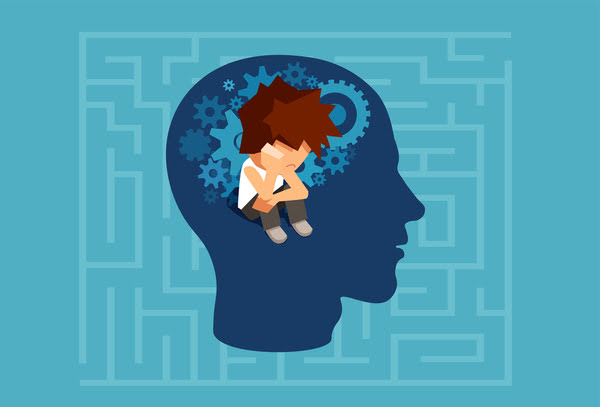When you experience a traumatic event, your mind perceives great danger and goes into survival mode. When your mind is in survival mode, your senses sharpen, and you enter into this super-learner mode, trying to understand your current situation as much as possible.
The mind tries to learn as much as possible about a traumatic event to avoid re-experiencing the same or similar events.
Humans mainly learn by forming associations.
To learn about a traumatic event, the mind asks:
“What caused this event?”
“What happened before, during, and after it?”
“What can I associate this event with?”
The answers to these questions comprise the context in which the traumatic event occurs. This context can be mental as well as physical.
Mental context is the thoughts, memories, and emotions associated with the trauma, while physical context is the sights, smells, and sounds associated with the trauma.
Why childhood trauma gets repressed
People experience traumatic events differently. In some people, the pain of trauma is too much for them to handle. They end up repressing or forgetting their trauma.
When you’re incapable of dealing with a traumatic event because you’re in a helpless position, you’re likely to repress it. Childhood is a perfect example of being in a helpless situation.
So, you’re likely to repress childhood trauma. When you’re a child, you’re highly dependent on your caregivers. If they traumatize you, you can’t fight or flee. You have to forget it and move on for the sake of your survival.
Suddenly remembering childhood trauma
1. Re-experiencing attachment trauma
When you grow up and empower yourself via a successful career, healthy relationships, and good health, the mind sees that you can help yourself.
Seeing you in this empowered, secure, and safe state, your mind finally decides that it’s time to help yourself. It’s time to resolve past hurts and wounds.
This is especially true for romantic relationships. When you’re in a romantic relationship, your mind sees it as the same as your relationship with your primary caregivers.
So, if you had attachment issues with your parents, they’re likely to resurface in your romantic relationship. Your mind is trying to use your romantic partner to fix your relationship with your parent.
When there’s a conflict in your relationship, your subconscious sees it as a conflict with your parent. Your old wounds get touched, and you re-experience your childhood trauma.
If a caregiver abandoned you, you’ll re-experience the trauma of abandonment when you break up with your partner.
Many people experience a resurfacing of their traumatic childhood memories when their abusive parent dies. Their mind’s like:
“Now you’re permanently safe from the abuser. Let’s work through this painful stuff now.”
2. Physical triggers
When you’re put in the same or similar context in which your trauma occurred, the traumatic memories are likely to resurface.
For instance, if you were traumatized in school, your painful memories will resurface when you visit that school years later.
Sometimes, hearing your abuser’s name in a conversation may be enough to resurface traumatic memories.
If your abuser wore a specific perfume, encountering that smell can trigger traumatic memories.
When you become a parent, how you parent your child might remind you of how your parents parented you. This is an example of a similar context triggering the resurfacing of traumatic memories.
3. Mental triggers
Memories are linked to emotions in the mind. So, it’s not just the sensory information from the physical context that can bring back traumatic memories. The mental context can, too.
Thoughts are linked to memories, and memories are linked to other memories. You may be thinking about something harmless from your childhood. That memory will lead to another memory, which will lead to another.
Eventually, this memory chain may lead you to a traumatic memory from childhood.
Similarly, emotional chains also exist in the mind. The same type of emotions are linked to each other. Negative emotions in the present remind you of the negative emotions you experienced in the past.
For instance, if you’re going through a particularly stressful time in your life, you may be feeling:
- Fear
- Anger
- Sadness
- Helplessness
- Confusion
- Loneliness
If you experienced the same concoction of emotions when you were traumatized in childhood, then this is likely to resurface your traumatic memories.

